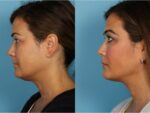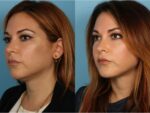What is chin augmentation?
Chin augmentation is a surgical procedure that enlarges the chin. The most common technique involves using an implant made from silicone, although other materials, such as cartilage or bone, may also be used. Chin augmentation is often performed in conjunction with other procedures, such as rhinoplasty or a facelift. It can be used to correct a weak or receding chin or to enhance the overall facial appearance.
Chicago chin augmentation
One area that can cause significant imbalance to the overall appearance of the face is the chin. A small or short chin makes the neck look less defined and creates the illusion of having a larger nose. Even small changes in the size of the chin can result in a very noticeable improvement in the overall balance of the face. Chin augmentation is performed through a small incision below the chin through which a soft, biocompatible implant is secured in front of the lower jaw. Some bruising and swelling is expected, but this typically resolves within 1 week. Results can be dramatic with this type of procedure.
How much does a chin augmentation cost?
Getting chin implant surgery typically costs between $1,500 and $3,000. Sometimes, your health insurance may cover part or all of the cost of chin implant surgery. It’s important to note that the cost of surgery should not be the only factor when considering surgery. It’s also important to research the surgeon’s qualifications, experience, and reviews from previous patients. Surgery is a serious decision and should not be taken lightly.
How long does chin implant surgery healing take?
Healing times for chin implant surgery may vary but typically take two to four weeks. The surgical site will be bandaged, and a compression garment must be worn to reduce swelling. Recovery time also depends on the type of implant used and the patient’s overall health and healing ability. Generally, patients can return to work within two weeks of surgery. Strenuous activity should be avoided for at least four weeks after surgery.
What are the benefits of chin implants?
Chin implants can improve the balance and proportions of the face. They can also give a more youthful appearance by restoring some lost facial volumes common with aging. Additionally, chin implants can help to correct a weak or receding chin.
In general, chin implants provide a subtle but effective enhancement to facial features. They are a popular choice for patients looking to improve their appearance without undergoing more extensive surgery.
What to expect after a chin implant surgery?
You can expect a dramatic improvement in the appearance of your chin after surgery. Chin implants are a safe and effective way to improve the facial profile and create a more youthful appearance.
However, you may feel some swelling and bruising. You may also experience some discomfort and may have trouble speaking or eating for a few days. Sutures will close the incision, typically removed within seven to ten days. It is essential to follow your doctor’s instructions carefully following surgery to ensure a speedy and successful recovery.
Chin and cheek augmentation / implants
Chin and cheek injections, augmentation, or implants can be performed in Dr. Sidle’s Chicago office at Northwestern Memorial Hospital. Dr. Sidle, a plastic surgeon who specializes in the face, approaches each patient with overall facial harmony in mind. Enhancing the contours of the chin and cheek will provide a more sculpted appearance and a more balanced profile.
If you opt for injections, the results may last between six months and two years depending on the type of material used. This is often a good option for patients who are interested in augmentation but are not yet ready for a surgical procedure. It is also a good way to “test drive” the new look.
If the decision is made to pursue a facial implant, this is a brief outpatient procedure that provides a permanent, predictable result. When you have your consultation with Dr. Sidle, he will discuss both options, and you will decide together which approach is better for you.
What does cheek augmentation do?
Cheek augmentation is a surgery that can be used to change the shape and size of your cheekbones. Your cheeks are made up of fat, muscle, skin, and cartilage, so through this type of “liposuction” or “fat transfer” procedure, you can enhance the appearance of your face by adding more volume. The aim is to create a youthful and fuller look without relying on fillers. Fat harvested from body folds or below the chin is transplanted into desired areas with syringes or probe needles. It’s primarily performed on people who lack natural facial definition in their cheeks, want a rounder face shape, or whose weight loss has been significant since they lost weight and sunken.
Chicago cheek implants
Cheek implants to create full, high cheeks can have a similarly meaningful effect on your appearance, making your face look more sculpted and youthful. Cheek augmentation can eliminate the “sunken” appearance under the eyes and fill out a “hollowed” mid-facial area. These improvements can be made by using injectable fillers, the patient’s own fat, or a permanent implant. Generally, healing is quite rapid, and there may be no external scars. Mild bruising and swelling often occurs but typically resolves within 1 week.
Dr. Sidle ensures that patients are well-informed by providing images of similar procedures before and after. This allows patients to visualize the potential outcomes and make informed decisions about their cosmetic surgery options.
How much do cheek implants cost?
Cheek implants can cost anywhere from $1200 to $8000 depending on the type (silicone, saline), size of the implant (50cc – 500cc), area of the face receiving implants, and surgery difficulty. It varies depending on which cheek surgery is performed. Large cheek implants act like jowls and might need to be removed if they cause drooling or swallowing issues. Silicon cheek fat injections around the mouth could improve your lower lip’s lines and a drooping lower lip borderline created by excess fat in that part of the body. Fat grafting may also be necessary for other areas of the body, such as breasts or buttocks, but not patches at this stage.
Why choose Dr. Sidle for your chin or cheek augmentation surgery?
Experience Matters. As a double board-certified Facial Plastic Surgeon at Northwestern with special expertise in rejuvenation of the eyes and face, Dr. Sidle can provide you with an individualized plan to restore a more youthful appearance to your face. Call our office for a one-on-one consultation.
Chin and Cheek Augmentation FAQs
Cheek Implants can last for a lifetime. For some people, it may help to consider this a long-term investment rather than something that can be removed after temporary use. Fortunately, implants can withstand the test of time by retaining their natural appearance and functionality for many years, while most other medical procedures require continual upkeep through upgrades and revisions.
Cheek implants typically only affect the shape of the face – most people notice less aging in their headshots after receiving cheek implants, and their appearance changes after surgery – but it doesn’t change a person’s smile or the way they present themselves to others. One study reported that cheek implants made teeth look whiter. It is important to note that for some people, having more prominent cheeks may help them feel more confident due to aesthetic reasons alone and not because they believe these features will lead them to a better social reputation or more friends.
The suitable candidates for cheek implants are people who have lost volume in the back of their mouth due to weight loss, age, or other factors. This can also occur after a tooth extraction in which bone and gum tissue is trimmed away from the area behind one’s teeth. Cheek implants are small silicone balls inserted via an incision made inside the mouth to be positioned near the cheeks. Once they’re set correctly, the implants remain there permanently – though for safety reasons, it may take up to six months before you should get a pair of dentures.
Chin implants can be either silicone or solid silicone. Most implants are inserted through a small incision under the chin and then positioned over the jaw’s bone. Once in place, the implant is secured with screws or titanium plates. Scarring is usually minimal and will fade over time.
After surgery, most people experience temporary swelling and bruising, which will subside within a few weeks. You will likely have to wear a compression bandage for several days following surgery. Sutures are usually removed within 7-10 days after the surgery. Recovery time varies from individual to individual, but most people feel comfortable returning to work within 1-2 weeks post-surgery.
Swelling and bruising are normal after surgery. It is important to avoid talking for the first few weeks. In most cases, speaking after a chin implant should be possible. If the new bone from the chin implant has started to fuse with your skull, then you will not be able to talk properly and will need an osteotomy due to this lack of mobility in the jaw.
Yes – We usually recommend people have a light, high-protein meal 7 – 9 hours after surgery. Protein will absorb slowly into the bloodstream and not overstress an already-stressed digestive system. Of course, you can’t eat anything too heavy or dairy products.
Chin implants are a popular facial procedure used to improve the appearance of the jawline and chin. They can give the impression of a stronger, more angular jawline and help balance facial features. In general, chin implants are relatively safe and effective procedures that produce good results in most patients. However, as with any surgical procedure, there are some risks associated with chin implant surgery, so it’s important to discuss all potential risks and benefits with your surgeon before making a decision.
You may need to take antibiotics if you experience any swelling or drainage from the implant site. You will also likely be prescribed pain medication. Follow your surgeon’s instructions for taking these medications.
If you are a smoker, you should stop smoking at least two weeks before surgery and for two weeks afterward. Smoking increases the risk of surgical complications significantly. For more details, you can read Chin Implant Post Operative Instructions.
A chin implant can profoundly affect the appearance of the nose. A weak or receding chin can make the nose appear too large for the face, and a chin implant can help to restore balance and proportion.
Occasionally, a chin implant may correct a deviated septum or improve nasal airflow. If you are considering surgery to improve the appearance of your nose, be sure to discuss all of your options with a qualified plastic surgeon.
Post-operative Instructions
All post-operative instructions can be found on the Patient Resources page.
Our Results
Click here to access Dr. Sidle’s Before & After Gallery for all procedures.






